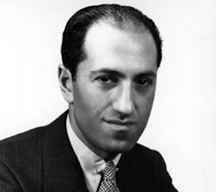|
 Gershwin,
George Gershwin, George (1898-1937), American composer, whose musicals
and popular songs are among the finest in those genres and whose compositions
in art-music forms are infused with the idioms of jazz and popular
music. Gershwin was born in Brooklyn, New York, on September 26, 1898.
He studied with the American composers Rubin Goldmark, Henry Cowell,
and Wallingford Riegger and with the Russian-born composer and theorist
Joseph Schillinger. At the age of 16 Gershwin became a pianist and
song promoter for a music publishing firm, but the success of his
song "Swanee" (1918) established him as a Tin Pan Alley composer.
The lyrics for nearly all his songs were written by his brother Ira
Gershwin, his collaborator in a series of revues and musical comedies
that included George White's Scandals (1920-24); Lady Be Good (1924);
Funny Face (1927); and the political satire Of Thee I Sing (1931),
the first musical comedy to win a Pulitzer Prize. Gershwin's songs
are marked by uncommon harmonic inventiveness, and he was one of the
first to introduce into popular songs the rhythms and melodic twists
of jazz. Among his best-known songs are "The Man I Love,""I Got Rhythm,"
and "Someone to Watch Over Me." At the invitation of the bandleader
Paul Whiteman, Gershwin wrote his Rhapsody in Blue (1924) for piano
and jazz band, later orchestrated by the American composer Ferde Grof�.
The work profoundly influenced European and American composers to
use jazz-derived melodic and rhythmic patterns. Gershwin's other concert
works include the Piano Concerto in F (1925), the tone poem An American
in Paris (1928), the Second Rhapsody (1931) for piano and orchestra,
and the opera Porgy and Bess (1935). Based on a novel by the American
writer DuBose Heyward, Porgy and Bess draws on the idioms of black
folk music, jazz, Tin Pan Alley, and European classical music to produce
a work of unique character that is Gershwin's masterpiece. Gershwin
died in Beverly Hills, California, on July 11, 1937. Gershwin,
George Gershwin, George (1898-1937), American composer, whose musicals
and popular songs are among the finest in those genres and whose compositions
in art-music forms are infused with the idioms of jazz and popular
music. Gershwin was born in Brooklyn, New York, on September 26, 1898.
He studied with the American composers Rubin Goldmark, Henry Cowell,
and Wallingford Riegger and with the Russian-born composer and theorist
Joseph Schillinger. At the age of 16 Gershwin became a pianist and
song promoter for a music publishing firm, but the success of his
song "Swanee" (1918) established him as a Tin Pan Alley composer.
The lyrics for nearly all his songs were written by his brother Ira
Gershwin, his collaborator in a series of revues and musical comedies
that included George White's Scandals (1920-24); Lady Be Good (1924);
Funny Face (1927); and the political satire Of Thee I Sing (1931),
the first musical comedy to win a Pulitzer Prize. Gershwin's songs
are marked by uncommon harmonic inventiveness, and he was one of the
first to introduce into popular songs the rhythms and melodic twists
of jazz. Among his best-known songs are "The Man I Love,""I Got Rhythm,"
and "Someone to Watch Over Me." At the invitation of the bandleader
Paul Whiteman, Gershwin wrote his Rhapsody in Blue (1924) for piano
and jazz band, later orchestrated by the American composer Ferde Grof�.
The work profoundly influenced European and American composers to
use jazz-derived melodic and rhythmic patterns. Gershwin's other concert
works include the Piano Concerto in F (1925), the tone poem An American
in Paris (1928), the Second Rhapsody (1931) for piano and orchestra,
and the opera Porgy and Bess (1935). Based on a novel by the American
writer DuBose Heyward, Porgy and Bess draws on the idioms of black
folk music, jazz, Tin Pan Alley, and European classical music to produce
a work of unique character that is Gershwin's masterpiece. Gershwin
died in Beverly Hills, California, on July 11, 1937.
|